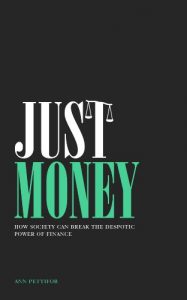
We all spend a lot of our time thinking about money; how to get it, how to spend it. But its nature eludes most of us. We do not ask what money is, and so we organize our lives around a mystery.
Professional economists aren’t much help. The mainstream of the discipline and most of its critics are unanimous in seeing money as a neutral medium of exchange and finance as a mechanism for connecting lenders to borrowers. If you stray from this consensus you will find yourself in a wilderness of goldbugs and Bitcoin enthusiasts.
In Just Money the acclaimed economist and critic of modern finance Ann Pettifor explains authoritatively and clearly what money is, where it comes from, and how it is currently controlled. She goes on to describe how we the people can use an improved understanding of money and finance to build economies that are more productive and just than the bank-ridden rackets we are currently lumbered with.
Another world, a fairer world, is possible. But if we want to secure it we will have to do away with our inhibitions and misconceptions about the most misunderstood invention in human history. Just Money sets out in plain terms the link between the change in our pocket and the change we want to see in the world.
“Ann Pettifor, director of Prime Economics, is a fantastic economist.”
Philip Aldrick
“Ann Pettifor’s economic analysis has proved prescient in the past. Today her work becomes increasingly relevant for those wanting to understand the link between easy but costly credit, the rise in consumption and greenhouse gas emissions. Above all Ann’s demolition of the argument that ‘there is no money’ to reduce poverty, finance childcare and fund the transformation of our economy away from fossil fuels, makes her work essential reading for Greens everywhere.”
Caroline Lucas MP
“The critical issue is, if you can map a system, you can start to see what people aren’t actually watching, the dark corners, and often it’s the dark corners that really matter. Ann deserves a lot of credit because she was trying to highlight these issues many, many years ago, and unfortunately, there weren’t enough people who were trying to map the system, model it, and then above all else, modify it. We have to map the financial system and then work out how to change it going forward.”
Gillian Tett
“As we wrestle with the biggest economic and environmental crises facing society, Ann Pettifor is a rare voice giving us a brilliant analysis of the overweening privilege given to finance. Her vital insight has been to explain how money, and the way banks are allowed to create and allocate it, fuels both economic and environmental havoc. Without Ann’s call to re-imagine our bank and money system, we would not be able to find even the beginnings of the answers we desperately need.”
Andrew Simms
“Ann Pettifor, the wonderful economist who first said that ‘Britain is living in an Alice in Wongaland economy’, a line that on its own is worthy of a Nobel economics prize, points journalists to George Osborne’s Mais lecture of 2010. He was then a model of fiscal rectitude. Britain had to move away from ‘unsustainable private and public debt,’ he said, to ‘a new model of economic growth that is rooted in more investment, more savings and higher exports’.”
Nick Cohen
Author: Ann Pettifor
Binding: Kindle Edition
Manufacturer: Commonwealth Publishing
Number of pages: 232
Product group: eBooks
Studio: Commonwealth Publishing
Publication Date: 2014-01-15
Publisher: Commonwealth Publishing
Pages: 232
 Heterodox
Heterodox
